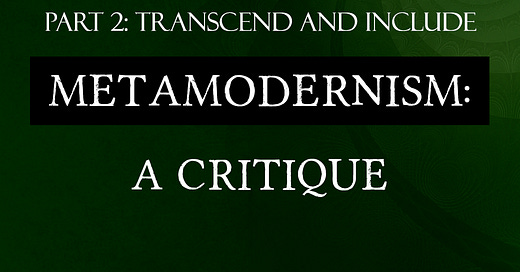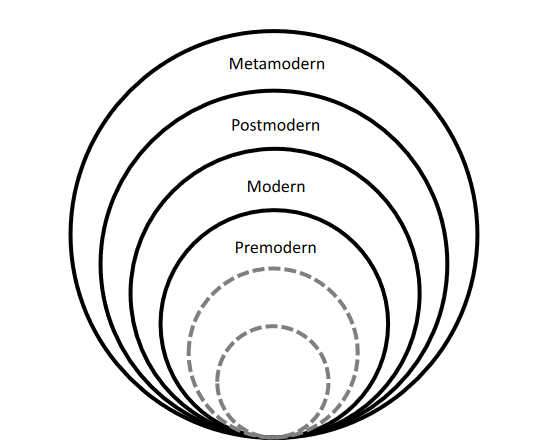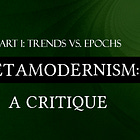
This is the second in a series of critical ponderings on Metamodernism. As mentioned in the first instalment there will be a podcast interview with Brendan Graham Dempsey on his Metamodern Spirituality podcast afterwards to chat through some of these criticisms. Previous instalments: Intro, Part 1, Part 2, Part 3, Part 4, Part 5, Part 6, Metamodern Meaning Podcast.
Following up on the last piece, today we are going to talk a little more about the Zeitgeist periodisation schema at the heart of almost all Metamodernisms (Modern → Postmodern → Metamodern). What I’m trying to figure out is how the metamodern aesthetic sensibility (ironic sincerity, informed naiveté, pragmatic idealism) got sewed up with process ontology, systems theory and developmental psychology.
In his book-length overview of the field in 2024, Metamodernism: A Cultural Logic of Cultural Logics, Dempsey frames Metamodernism not as a Marxian or Hegelian period (i.e. dialectical stage) in history (à la Vermeulen and van den Akker) nor as a stage of human development (à la Hanzi Freinacht) but as a cultural logic. He’s following in the footsteps here of Fredric Jameson and his work on the “cultural logic” of Postmodernism in 1991.
On the face of it the term cultural logic seems more innocuous. But the more I’ve thought about the less convinced I’ve become. It seems to me that “cultural logic” is no more innocuous a term than developmental stage or dialectical stage. On the contrary, these characterisations of Metamodernism are, as well as being bad framings, a danger to the effectiveness of Metamodernism.
Dempsey frames Metamodernism as a “cultural logic of cultural logics”. It’s the subtitle of his book and the refrain throughout it. This idea of cultural logic is the red thread Dempsey uses to tie together the various strands of Metamodernism. I am uneasy with the inchoate and expansive scope of this term1.
It has taken me a long time to triangulate the source of my uneasiness. This no doubt stems from the fact that there is a part of this conception I am sympathetic to and another part I am repelled by. But after much reflection I have differentiated the baby and the bathwater for Metamodernism2. I’ll leave the baby for later. For now, let’s talk about the bathwater.
In the first chapter of Metamodernism: A Cultural Logic of Cultural Logics, in which he articulates what he means by cultural logic, Dempsey frames Metamodernism in a manner parallel to Ken Wilber’s Integral framing (which Hanzi Freinacht in his 2017 Metamodernist theory work The Listening Society explicitly recapitulates). This is the framing of Metamodernism as a cultural logic that “transcends and includes” all previous cultural logics. Dempsey doesn’t use the phrase “transcend and include” but decentration. The result is the same: Metamodernism is the hegemonic cultural logic. It is the most advanced, complex cultural logic there is. On p.8 he writes:
“all formulations of the metamodern have in common an attempt to move beyond postmodernism yet by means of postmodernism.”
He illustrates this decentration with this diagram and the following:
“As this diagram suggests, all the prior epistemes continue to live on within metamodern culture—but are no longer the driving cultural logic. The metamodern perspective thus contains the postmodern, as well as the pre-postmodern, as enduring modalities available to it. Indeed, from its vantage, the metamodern is able to toggle between these different modalities. Like a browser with many tabs, or a hypertext with many links, the metamodern can move through many different windows.” (p.14) [emphasis mine]
This idea of “nested” “Russian doll” cultural logics is not a new idea; we can trace such conceptualising back to Marx and before him to Hegel and German Idealism. But while it is not new, it is certainly controversial.
The idea that previous (“enduring”) cultural logics are somehow contained in the Metamodernist’s mind and intuitively “available to it” seems hubristic to me.
The thing about the term cultural logic and Hegelian/Marxist/Integral generalisations like Premodern, Modern, Postmodern (or Faustian, Post-Faustian, Modern, Postmodern in Freinacht’s terms) is this: it is brutally reductionistic. To speak of a cultural logic is to speak of a singular “spirit of the times”.
In the 21st century we don’t have just techno-optimists, Incels, TERFs and Doomers but Zionists and anti-Zionists, Bitcoin maximalists, Anarchists, Effective Altruists, Fox News dads, Normies, Proud Boys, Jungians, weebs, Men’s Right’s Activists, Nihilists, Absurdists, Transmedicalists, Enlightened Centrists and so on ad nauseam.
Perhaps we might find forms of discourse emerging in all of these groups such as memes and hit pieces. But I don’t think we’ll find ironic sincerity, informed naiveté or pragmatic idealism emerging among all these groups —not to mention a proclivity for complexity science, process ontology and developmental psychology.
Of course, one might reply that these are groups at different “stages” or represent different “layers” of cultural logics and characterise them as “residuals” or “emergents” but let’s consider “Premodern” cultural logics.
Turning our attention to Classical Antiquity let’s ask what cultural logic we are referring to when we speak of this era (assuming, of course, it gets the privilege of being a distinct cultural logic rather than being swept up in the big bucket marked “Premodern”)? When we speak of the cultural logic of Classical Antiquity which one are we speaking of? Which one might we say is “available to” the Metamodernist today? The Spartan? The Persian? The Athenian? The Athenian before the Peloponnesian War? The worldview of 1st century Nazarenes? Or of the Late Roman Republic? In this latter case do we mean the worldview of the Senate or of the Gracchi? Of Cato and Brutus or Marius and Caesar?
When we pull apart the threads that are gathered together in a cultural logic such as Premodern, Modern or Postmodern it is impossible to find a coherent singular cultural logic that unites these groups.
No. I can see no overarching cultural logic that we can take for granted.
Metamodernism, when conceived as a nested series of “transcending and including” cultural logics/zeitgeists/epistemes/developmental stages, totalises.
Perhaps I am mischaracterising Dempsey’s view and the view of many metamodernists. I hope so. But this is what I perceive in Freinacht’s Integral Metamodernism and in statements of Dempsey’s such as:
“[Cultural logics], and [cultural logic] evolution, are part of the process of cosmic complexification. They are what recursive emergence looks like on the plane of Culture.” (p.184)
“In short, while there is no absolute standard by which to judge a cultural logic, there is a relative one: namely, How many of the other cultural logics it can nest within its own logic.” (p.18)
There is more to be said about the dangers I perceive in this zeitgeist version of Metamodernism and much I want to say about a more modest Metamodernism. These will be covered in future instalments.
Next time we’re going to pull the thread of this “transcend and include” developmental decentration theme again and question the theory on its own terms by asking why we should suppose a single developmental strain rather than a conflicting development.
Once again, for anyone, for any Metamodernists (or other critical readers) reading, I’d love to hear your thoughts on any blindspots, oversights, errors, distortions or strawmen you see in this or any other piece in the series. As I said in the intro this isn’t some polished piece of art but a wrestling to articulate something I sense. If I’m mistaken I’d love to know; future pieces can benefit from that knowledge.
Next:
Previous:
I’m unsure to what extent this discomfort would translate to Jameson’s conception of cultural logic so I’ll set that aside and maybe Brendan can enlighten me in our podcast discussion in a few weeks.
As I discussed in previous instalments, this applies to my relationship to Metamodernism. There is likely to be axiomatic dissonance between my perception and others’. As such these critiques are about what I perceive to be the baby and the bathwater. It is my best attempt at truth but we are all working with different axioms — a theme we’ll be revisiting in the next instalment.













I feel there is depth and nuance to this critique, and it is necessary. So thank you—the network will surely benefit from this interrogation and responses.
The question i have so far is: what do you think is the over-arching/underlying problem facing gloabl culture/society today? What is the diagnosis? What is the response?
The metamodernists i know seem to be more or less clear on the dire situation we are in: the meta-crisis, for lack fo a better term—and that's the starting point. Premodern traditional power hierarchies, modern scientific authority, and postmodern language games & identity politics are all roads to ruin, flavors of authoritarianism and nihilism. The metamodern attempts to honor all of these, and provide a ground of consilience for the globe moving forward. A cosmological story of reality that weds and evolves spirituality and science.
Sorry if this sounds blunt or simplistic. But we're at a breaking point. People's nervous systems are fucked, so many folks are uttterly lost, and we're a couple of wrong moves away from disaster.
So again, what's your starting point? What's motivating this? And where do you hope we end up?
I can't quite yet sense the stakes of this critique (which may be my own fault).
With respect & appreciation